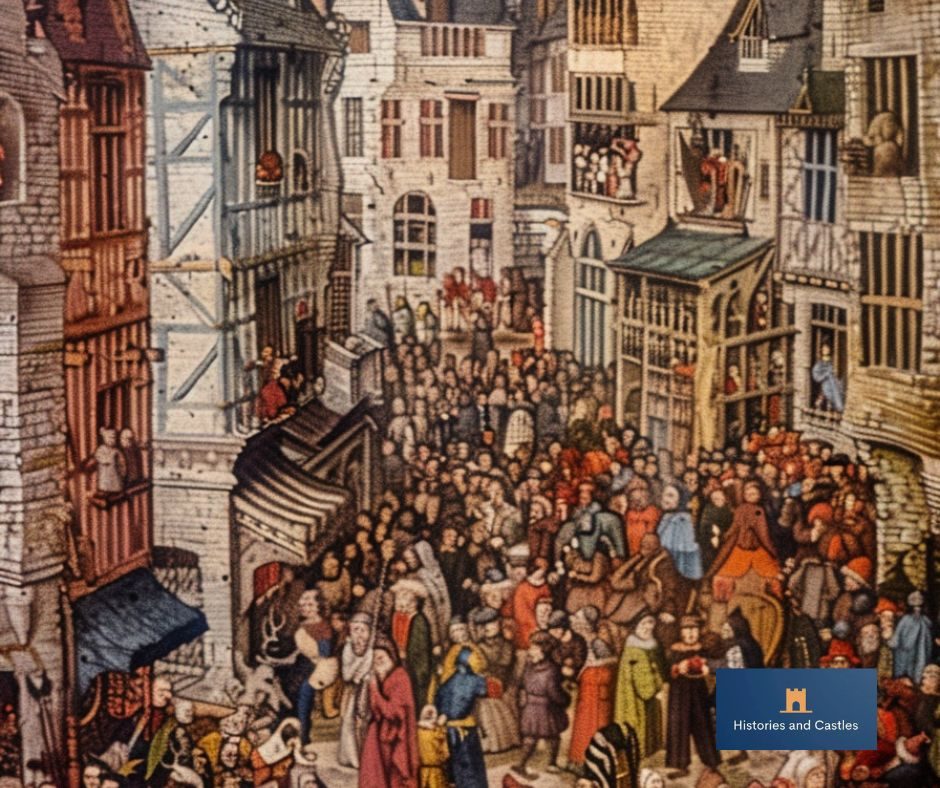In 1290, King Edward I of England issued an edict for the expulsion of all Jews from his kingdom. This dramatic event had profound and lasting impacts on medieval English society and economy. Understanding these effects offers a window into the complexities of medieval life and the far-reaching consequences of such sweeping policies.
The Background

The Jewish community in medieval England was significant, having established itself after William the Conqueror’s invitation in 1066. Jews played a crucial role in the economy, primarily as moneylenders. This was a necessary function, as usury (charging interest on loans) was forbidden to Christians by the Church. Despite their economic importance, Jews faced intense discrimination and periodic violence, culminating in their expulsion in 1290.
Historical Context
The Jewish community in England had experienced fluctuating levels of tolerance and persecution since their arrival. Initially invited for their financial acumen, Jews quickly became integral to the English economy. They were permitted to lend money at interest, a practice forbidden to Christians due to the Church’s stance against usury. This unique position allowed Jews to finance significant royal and ecclesiastical projects, contributing to the economic development of the kingdom.
However, this financial role also made Jews targets of resentment. They were often accused of exploiting Christians, leading to widespread anti-Semitic sentiments. Blood libel accusations, where Jews were falsely accused of using Christian children’s blood in religious rituals, further inflamed public hostility. Economic envy and religious intolerance combined to create a volatile environment for Jews, setting the stage for their eventual expulsion.
Economic Impact
Financial Disruption
The expulsion of Jews caused immediate financial disruption. Jewish moneylenders had financed numerous ventures, including royal projects and merchant enterprises. Their sudden removal led to a credit crunch, as there were no immediate replacements for their services. Many debtors found themselves free of their obligations, which might seem beneficial but actually led to broader economic instability.
Immediate Effects
The immediate economic impact of the expulsion was a severe credit crunch. Jewish moneylenders had been a crucial source of credit for many sectors, including the monarchy, nobility, and emerging merchant class. With their expulsion, these groups suddenly lost access to much-needed funds. This led to a halt in many construction projects, including important royal and ecclesiastical buildings, as well as a slowdown in trade and commercial activities. The absence of Jewish moneylenders created a vacuum that was not quickly filled, leading to economic stagnation and uncertainty.

Long-term Financial Adjustments
In the long term, the English economy had to adapt to the absence of Jewish financiers. Alternative financial systems began to develop, including the rise of Christian moneylenders and the increased use of Italian merchant bankers, who operated within the constraints of Church doctrine by finding creative ways to charge interest. This period of adjustment was marked by economic instability as new financial institutions took time to establish themselves and gain trust.
Property and Wealth Seizure
Upon expulsion, Jewish property was confiscated by the Crown. This influx of assets temporarily boosted royal coffers but disrupted local economies. The confiscated properties, often businesses or urban real estate, were redistributed, sometimes to loyal subjects or sold off, but the abrupt change in ownership led to inefficiencies and economic downturns in certain areas.
Impact on Local Economies

The confiscation of Jewish property had varied impacts on local economies. In some areas, the redistribution of Jewish-owned properties led to economic stagnation as new owners lacked the expertise to manage these assets effectively. In urban centres, where Jews had been prominent in trade and crafts, the sudden loss of Jewish businesses disrupted local markets and supply chains. Towns that had relied on Jewish craftsmen and merchants experienced declines in economic activity, leading to increased poverty and social unrest.
Loss of Expertise
Jews were not just moneylenders but also skilled craftsmen, doctors, and merchants. Their expulsion meant a loss of expertise and skills that affected various sectors of society. The gap left by their departure was not easily filled, leading to a decline in certain crafts and trade activities.
Skilled Labor Shortage
The expulsion resulted in a significant loss of skilled labor. Jewish artisans, who had been integral to various crafts, left a void that was not easily filled. This shortage affected industries such as textiles, metalwork, and medicine. For instance, Jewish physicians, who were often highly regarded, left a gap in medical care, affecting public health. The absence of Jewish merchants also disrupted trade networks, leading to a decrease in the availability of certain goods and a rise in prices.
Social Impact
Increased Anti-Semitism
The expulsion formalized and institutionalized anti-Semitic sentiments. It reinforced the perception of Jews as outsiders and scapegoats for societal problems. This legacy of prejudice had long-lasting effects on English society and attitudes toward minority groups.
Institutionalized Discrimination
The expulsion of Jews was not just a reflection of existing anti-Semitic attitudes but also served to institutionalize and legitimize them. It sent a clear message that Jews were unwelcome and could be expelled at any time. This precedent reinforced anti-Semitic beliefs and practices, contributing to a culture of intolerance that would affect future generations. The legacy of the expulsion can be seen in the recurring patterns of discrimination and violence against Jews and other minority groups throughout English history.
Social Reorganization
The removal of the Jewish population led to a reorganization of social structures, especially in urban areas. Jews had formed tight-knit communities, contributing to the cultural and social fabric of medieval towns. Their absence altered the dynamics of these communities, leading to changes in trade patterns, social hierarchies, and local governance.
Community Dynamics
Jewish communities had been integral to the social and economic life of many towns. Their expulsion disrupted local social structures, as Jews often played key roles in local governance, trade associations, and community life. The absence of these communities led to a reorganization of social hierarchies, with other groups vying to fill the void left by the Jews. This reorganization often led to increased social tensions and conflicts as different factions competed for control of resources and influence.
Cultural and Intellectual Decline
Jewish scholars and intellectuals had contributed to the cultural and intellectual life of medieval England. Their expulsion resulted in a cultural and intellectual void. Jewish contributions to science, medicine, and philosophy were abruptly halted, leading to a period of stagnation in these fields.
Intellectual Contributions
Jews had been significant contributors to the intellectual and cultural life of medieval England. Jewish scholars were involved in various fields, including science, medicine, philosophy, and literature. Their expulsion led to a decline in intellectual activity, as many of these scholars had been at the forefront of their respective fields. The loss of their contributions meant that England missed out on advancements in knowledge and culture that other regions of Europe, where Jews were allowed to remain, benefited from.
Long-term Consequences
The expulsion of Jews in 1290 had long-term consequences for England. The economic disruption was felt for decades, and the loss of a significant segment of the population had lasting social repercussions. The event also set a precedent for future expulsions and persecutions of minority groups across Europe.
Economic Shifts
In the longer term, the expulsion forced the English economy to adapt. Alternative financial systems developed, and new groups took on the roles previously held by Jews. This led to changes in the economic landscape, including the rise of merchant guilds and other financial innovations.
Emergence of New Financial Systems
The absence of Jewish moneylenders prompted the development of new financial systems. Christian merchants and bankers began to adopt more sophisticated financial practices, often borrowing techniques from their Jewish predecessors. The rise of merchant guilds and banking houses in cities like London and Bristol marked a significant shift in the economic landscape. These new financial institutions played a crucial role in supporting trade and commerce, facilitating England’s economic growth in the later medieval period.
Legacy of Intolerance
The expulsion entrenched a legacy of intolerance and exclusion that would resurface in various forms throughout English history. It set a precedent for the treatment of minority groups and influenced English policies and societal attitudes for centuries.
Precedent for Future Persecutions
The expulsion of Jews set a dangerous precedent for the treatment of minority groups in England and beyond. It demonstrated that a monarch could expel an entire community based on religious and economic motives. This precedent was followed in other European countries, leading to similar expulsions and persecutions. The legacy of intolerance and exclusion established by the 1290 expulsion influenced English policies toward other minority groups, including later waves of immigrants and religious dissenters.
Conclusion
The expulsion of Jews in 1290 was a turning point in medieval English history, with profound economic and social repercussions. The immediate economic fallout was severe, leading to financial instability and a loss of expertise. Socially, it reinforced anti-Semitic attitudes and disrupted community dynamics. The long-term effects included economic shifts and a legacy of intolerance that shaped English society for generations. Understanding this event sheds light on the complexities of medieval life and the far-reaching impacts of such drastic policies.
By examining the expulsion of Jews in 1290, we gain insights into the interconnectedness of society and economy and the enduring consequences of exclusionary practices.
Discover more from Histories and Castles
Subscribe to get the latest posts sent to your email.
